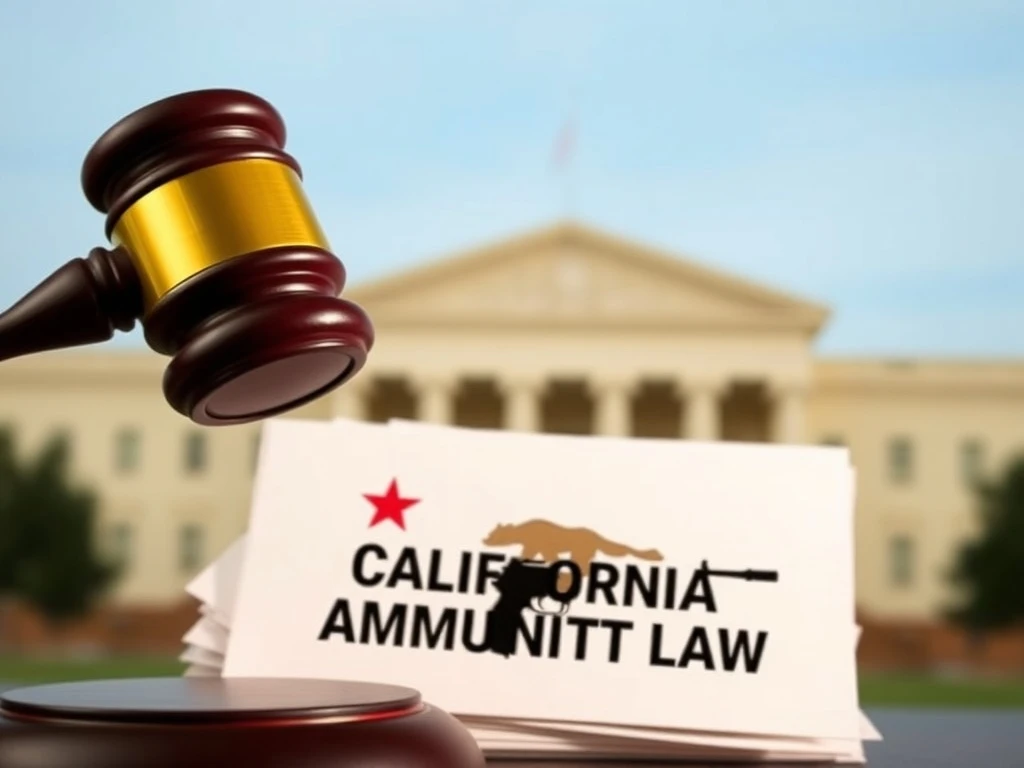California Ammunition Law: Landmark Victory for Second Amendment as 9th Circuit Strikes Down Background Checks

For many in the cryptocurrency world, the concept of individual liberty and resistance to overreaching regulation is a foundational principle. While our focus often lies on digital assets and financial freedom, legal battles in other sectors often reflect similar struggles. A recent 9th Circuit ruling has sent ripples through the legal landscape, striking down the California Ammunition Law requiring background checks for bullet purchases. This decision, while seemingly distant from blockchain, underscores the critical balance between public safety and constitutional rights – a debate familiar to anyone navigating the evolving regulatory environment of decentralized finance.
The Unconstitutional Strike Against California Ammunition Law
In a significant legal development, a federal appeals court has declared California’s law mandating background checks for ammunition purchases unconstitutional. This ruling by the 9th U.S. Circuit Court of Appeals upholds a lower court’s 2024 decision, marking a substantial setback for one of the state’s most stringent gun control measures. The California Ammunition Law, enacted in 2019 following its passage in 2016 through Proposition 63, required individuals to undergo a background check – costing either $1 or $19 – every time they bought ammunition. The court found that this requirement “meaningfully constrain[ed]” the constitutional right to keep and bear arms, enshrined in the Second Amendment. This move is a clear indication of increasing judicial scrutiny over expansive gun control legislation.
Why the 9th Circuit Ruling Matters for Second Amendment Rights
The core of the court’s decision rests on its interpretation of the Second Amendment. Judges emphasized that the right to “keep and bear arms” inherently includes the right to “operate” those firearms, which necessitates access to ammunition for self-defense. The court rejected California’s argument that the background check law served as a vital tool to track individuals illegally possessing firearms. Instead, Judge Sandra Segal Ikuta highlighted the undue burden placed on lawful gun owners. Critics, including the California Rifle & Pistol Association, had long decried the law as “absurdly restrictive.” They pointed out practical barriers, such as out-of-state residents and owners of older firearms often struggling to purchase bullets due to database inconsistencies. This ruling reinforces a growing trend of courts prioritizing individual gun rights when assessing the legality of modern gun control measures, particularly in light of recent Supreme Court guidance emphasizing historical gun regulations.
The Broader Impact on Gun Rights and Regulatory Scrutiny
This 9th Circuit ruling is not an isolated incident; it aligns with a series of recent judicial decisions challenging California’s strict gun laws. Previously, courts have invalidated state laws banning high-capacity magazines and assault-style weapons. Legal experts observe that the U.S. Supreme Court’s renewed emphasis on historical precedent for gun regulations has empowered challenges to contemporary laws that lack such historical grounding. This judicial approach suggests a shift, placing a higher burden on states to demonstrate that their gun control measures are consistent with historical tradition. For gun rights advocates, this ruling provides significant momentum, potentially inspiring similar challenges to ammunition access regulations in other states. John Parkin, a firearms industry representative, articulated the sentiment of many opponents, stating the law was “poorly designed” and made it “difficult or impossible for some legal gun owners to purchase ammunition.” The decision underscores the ongoing, intense tension between legislative efforts for public safety and the constitutional protections afforded to individuals.
Navigating the Challenges of Background Check Law Implementation
The court’s decision also brought to light significant operational flaws within California’s automated background check law system. A lower court ruling indicated that in the first half of 2023 alone, the system rejected 11% of applicants. This high rejection rate, often impacting lawful gun owners due to administrative errors or database issues, further fueled arguments about the law’s impracticality and burden. While the state championed the law as a crucial measure to prevent illicit gun use, opponents consistently argued that its implementation disproportionately affected responsible citizens. This practical failure of the system played a role in the court’s determination that the law imposed an “undue burden,” undermining its stated public safety goals by hindering lawful commerce and exercise of rights. The complexities of enforcing such a detailed background check law became a focal point of the legal challenge.
What This 9th Circuit Ruling Means for Other States
The implications of this 9th Circuit ruling extend beyond California’s borders. As courts increasingly apply a historical test to Second Amendment challenges, states with similar ammunition control measures may face heightened scrutiny. This decision could embolden gun rights organizations to launch similar legal battles, targeting regulations on ammunition access in states like New York, New Jersey, and Connecticut, which have also implemented various forms of ammunition sales restrictions. The outcome in California sets a precedent, particularly within the 9th Circuit’s jurisdiction, influencing how future cases are litigated and potentially reshaping the landscape of gun control across the nation. The ongoing legal debates highlight a national divide on firearm regulation, with courts now serving as crucial arbiters in defining the scope of constitutional rights versus legislative authority.
The 9th Circuit’s decision to strike down California’s ammunition background check law is a monumental victory for Second Amendment advocates and a significant setback for gun control proponents. By deeming the California Ammunition Law unconstitutional, the court has reinforced the right to acquire ammunition as integral to the right to bear arms. This ruling not only highlights the practical failings of the state’s background check law but also reflects a broader judicial trend of scrutinizing modern gun regulations against historical precedent. As the legal battle over gun rights continues, this 9th Circuit ruling is poised to influence legislative debates and legal challenges nationwide, further shaping the future of firearm regulation in the United States.
Frequently Asked Questions (FAQs)
1. What was the California Ammunition Law that was struck down?
The law, enacted in 2019 after passage in 2016, required individuals to undergo a background check for every ammunition purchase, costing $1 or $19 depending on eligibility.
2. Why did the 9th Circuit Court rule the law unconstitutional?
The court found that the law violated the Second Amendment by “meaningfully constrain[ing]” the right to keep and bear arms, arguing that access to ammunition is essential for operating firearms for self-defense. It also noted the undue burden on lawful gun owners and flaws in the background check system.
3. How does this ruling affect gun owners in California?
The ruling immediately halts the requirement for background checks on ammunition purchases. Lawful gun owners should now be able to purchase ammunition without undergoing the state’s previous mandatory checks.
4. What is the significance of this 9th Circuit ruling for other states?
This decision sets a precedent, particularly within the 9th Circuit’s jurisdiction, and could embolden gun rights advocates to challenge similar ammunition control laws in other states that have implemented them, potentially reshaping gun regulation nationwide.
5. What was California’s argument for the background check law?
California argued the law closed a “dangerous loophole” and enabled law enforcement to track individuals who illegally possess firearms by flagging them during ammunition purchases.
6. Will California appeal this decision?
Yes, California’s Democratic leadership, including Governor Gavin Newsom and the Department of Justice, have expressed strong disapproval and indicated they will explore further legal options, though the law was already stayed pending appeals.









